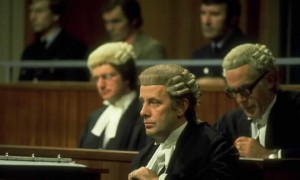“The position of the advocate causes much misunderstanding. The question addressed here is the often asked: “How can a self-respecting counsel honestly defend a person  whom he knows or believes to be guilty? How can he in honesty represent a client whom he believes to be a liar?” Such questions show woeful ignorance of the duties and obligations of the English legal system. Inasmuch as a barrister is the only person who has the right of audience in a Superior Court, that right casts upon him the absolute duty to represent to the best of his ability any client who requires his services and is prepared properly to instruct him”…
whom he knows or believes to be guilty? How can he in honesty represent a client whom he believes to be a liar?” Such questions show woeful ignorance of the duties and obligations of the English legal system. Inasmuch as a barrister is the only person who has the right of audience in a Superior Court, that right casts upon him the absolute duty to represent to the best of his ability any client who requires his services and is prepared properly to instruct him”…
“In a criminal trial the prisoner is entitled to be represented whether he be innocent or guilty, and the question of his innocence or guilt is no concern of the advocate who appears for him. Moreover, that very question never really comes before the Court at all. The issue which a jury is called upon to decide is not, as is often supposed, whether the prisoner is innocent or guilty, but whether the prosecution have succeeded in proving conclusively that he is guilty, which is a very different thing. Many a guilty person has been acquitted merely because his advocate has succeeded in destroying, wholly or in part, the evidence the Crown has produced against him. It is no part of the duty of a barrister to form any opinion as to what verdict a jury should return, his task is to place before the Court, with absolute honesty and to the best of his ability, the defence which the prisoner desires to raise. When he has done that, his duty is fulfilled.
In a civil action, the position is precisely the same. It is for the jury to decide which of the parties is telling the truth. Counsel are not bound to form, nor even justified in forming in advance, an opinion of their own, indeed if they attempt to do so the result may well spell disaster.
Many years ago, a client came to see me. He was a defendant in a civil action, and he wanted to tell me his story himself. He was quite sure I would not believe a single word he said. He told me a story so incredible that I felt bound to warn him of the risk he might be running by repeating that story under oath. But he was determined, and the case went to trial. Never do I remember a civil action which I approached with more reluctance. But I was wrong. Every single word that man told was the complete and absolute truth. At first the evidence given by his opponent from the witness box was so plausible, it seemed to carry conviction in its train, until all of a sudden the witness made one small slip, a chink had appeared, under cross-examination that chink widened, the witness floundered and prevaricated, desperately trying to extricate himself from the position in which he had placed himself, but in the end, broke down completely, and the action was dismissed. The client I had at first thought to be a liar was proved an absolutely honest man. Never again did I attempt a conclusion in advance.
I am satisfied that at least ninety per cent of all cases win or lose themselves, and that the result would be the same whatever counsel the parties had chosen to represent them. Of the remaining ten per cent it is not so easy to speak with certainty. Undoubtedly a case can be lost by bad advocacy, an indiscreet question may let in evidence otherwise inadmissible, an omission to appreciate an important fact may prevent the Court from ever becoming aware of a vital element in the case, there are endless ways a bad advocate can do his client irreparable harm. But can a brilliant advocate ever win a case that without him would have been lost? He can, but on the rare occasions which prove the exception to the rule.
If it were possible to watch the great men of yesterday, and record some hint of all they learned, they might confer a lasting benefit upon beginners in their own professions. A barrister builds up nothing, his practice dies with him, even he himself is soon forgotten, but he could at least leave behind the benefit of his experiences. Perhaps no one would pay much attention, but would not the experiment be worthwhile?”